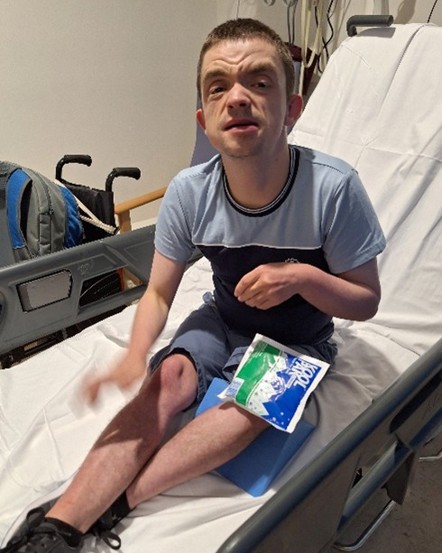Recovering from Broken Heart Syndrome

Kara Melissa
International school teacher turned stay-at-home mom. World traveller, food maker, writer, quilt maker, dreamer, activist, advocate, and part-time opt...
Did you know that you can die from a broken heart? In some extreme cases, broken heart syndrome can lead to severe, short-term heart muscle failure*. But in most cases it is treatable and recovery is possible within weeks.
What defines a broken heart?
Is it the loss of a loved one? A break up, or some other traumatic shock? The long, slow grieving process of a child’s sickness or neurological diagnosis? The wearing down of the self over time; always putting others before you?
What about separation from a partner because the relationship can’t handle the stress of raising a child with a disability, or you just weren’t compatible enough to weather this life together any longer.
What about the separation from a child due to time in the hospital?
What about endless appointments and siblings to take care of too? What about just forgetting you are important too? Broken heart syndrome presents as a sudden, sharp pain in the chest, right in the heart.
Shortness of breath following an extreme emotional or physical event. Women are more likely than men to experience this kind of pain, which is a reaction to the surge of stress hormones in the body. We have all heard how stress can make you sick, wear you down.
It can also kill you.
It’s an extreme thought, I know. But, even while not common in broken heart syndrome, it does happen. Our mental health can and does affect our physical health. And as parents, we often take care of ourselves last. As a parent of a child with a disability, it is even more likely that we are the last to visit the doctor.
Last week, I asked my husband to take me to the ER for these very symptoms. They had been happening for about four days. A pain so severe and constant, that I didn’t know what to do to make it go away.
It was not the heavy weight of a panic attack (I’d had one of those the week prior), but it also wasn’t accompanied by heart attack symptoms such as arm or upper back pain, or light-headedness/fainting.
I had no risk factors; being a vegetarian, a healthy weight, and moderately active. The ER doctor did not believe there was anything wrong with my heart. But my EKG (electrocardiograph) was abnormal, so a stress test was scheduled for the following week.
No one seemed interested that I was taking anti-anxiety medication or that I was under a lot of stress.
So I finally asked the ER doctor if one could have a heart attack because of a stressful event and he mentioned broken heart syndrome. A newly-defined diagnosis, not much is known about it, but it does exist.
When I returned the following week for a stress test, my EKG flagged me to do a stress echo, where ultrasound pictures would be taken before, during, and after a grueling ‘uphill’ bike ride.
What it showed was that my left ventricle was much wider than normal and my heart was pumping much slower whileresting than it should be. I was asked if I had a problem with alcohol (some binge drinking in college, over 20 years ago, was not likely the cause) or had been treated for cancer (no).
The doctor also said it was possible that a virus has caused an insult on the heart and I would eventually recover from it. Another echo was scheduled for a year out to see if my numbers had changed. I was diagnosed with borderline cardiomyopathy. I had a broken heart.
It was true, 2018 has not been kind to me. It has been a struggle.
I started taking antidepressants in April. I had anxiety attacks. I started seeing a psychotherapist. I finally started taking care of myself. I began to think about who I was again, outside of a wife, mother and caregiver.
But it was going to take time and I kept getting dealt punches and knocked down faster than I could climb out. It all caught up to me and my heart broke. I stared at the ultrasound pictures on the screen. My empty, slow-beating left ventricle. I saw it move faster and grow smaller with exercise.
A resting heartbeat should be a fast as what my heartbeat was when I exercising. Would exercise help? No, it just had to heal. Reducing alcohol intake would relieve some strain. Say goodbye to that glass of wine while preparing dinner...
What broke my heart doesn’t matter. It certainly was a collection of things.
What matters is our mental health and how it can affect our physical health. And as a parent of a child with a disability we are often struggling to balance dozens of appointments at a time, add a sibling recovering from a tonsillectomy, and some fairly big marital stresses and BOOM!
A broken heart. I’m only 41. I have to be here to take care of my kids. So I need to take care of me. I have to learn to say no when I feel overwhelmed. I have to learn to stand up for myself when something happens that is not healthy for me.
I have to take breaks. Take walks. Sleep more. Let go.
Letting go is big and it can mean so many things. But once set in motion, the weight lifts and the pain disappears and I feel lighter again. I start to remember who I was before all of the things I am now. I start to rediscover myself and explore new interests. I start to be me again. My heart begins to heal.
[*SOURCE https://www.heart.org/en/health-topics/cardiomyopathy/what-is-cardiomyopathy-in-adults/is-broken-heart-syndrome-real]


